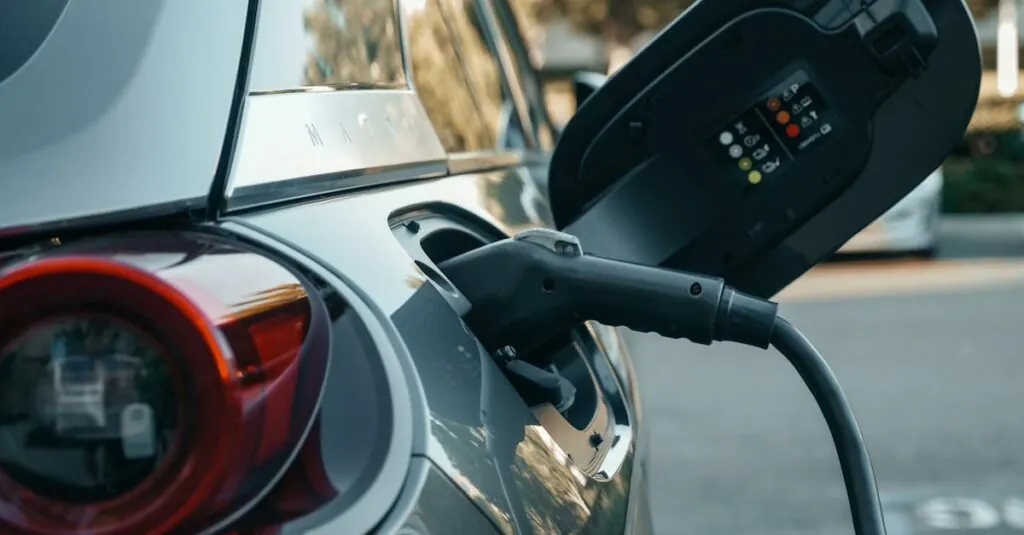As electric vehicles zoom into the mainstream, one question keeps buzzing around: how long do EV batteries last? It’s a hot topic, and for good reason. After all, no one wants to be stranded with a dead battery, especially when charging stations can feel as rare as a unicorn in a traffic jam.
Understanding battery longevity isn’t just about numbers; it’s about peace of mind. With advancements in technology, today’s EV batteries are designed to last longer than your last New Year’s resolution. But just how long can one expect these powerhouses to keep their juice? Buckle up as we dive into the fascinating world of EV batteries and uncover what really drives their lifespan.
Table of Contents
ToggleUnderstanding EV Batteries
Electric vehicle (EV) batteries play a crucial role in determining vehicle performance, range, and overall longevity. Knowledge about these batteries enhances the EV ownership experience.
Types of EV Batteries
Lithium-ion batteries dominate the EV market due to their efficiency and energy density. Nickel-metal hydride batteries also find common use, particularly in hybrid vehicles. Lead-acid batteries, while less common in modern EVs, appear in some applications due to their low cost. Solid-state batteries are emerging, promising greater safety and improved longevity. Each type influences vehicle performance and longevity differently.
Factors Affecting Battery Life
Battery life hinges on several key factors. Temperature significantly influences performance and degradation rates. Frequent rapid charging can lead to faster wear on the battery. Depth of discharge impacts longevity; shallow discharges tend to prolong battery life. Vehicle weight and driving habits also play roles; heavier loads and aggressive driving styles contribute to quicker battery depletion. Regular maintenance helps optimize battery performance, ensuring a longer lifespan.
Average Lifespan of EV Batteries
The lifespan of electric vehicle batteries varies based on several factors. Understanding these factors helps potential owners grasp the reliability of their investment.
Manufacturer Estimates
Manufacturers typically estimate electric vehicle battery lifespan at 8 to 15 years. Most offer warranties between 8 to 10 years or for a specific mileage, commonly around 100,000 miles. These warranties indicate confidence in battery durability. Different manufacturers may provide estimates based on their unique technologies and battery chemistry. Lithium-ion batteries generally fall within this range but can last even longer with proper care. Knowing these estimates helps consumers understand and plan their ownership experience.
Real-World Experience
In real-world scenarios, many electric vehicle owners report battery longevity exceeding manufacturer estimates. Some batteries reach over 200,000 miles before significant degradation occurs. Conditions like climate, charging practices, and driving styles play critical roles in actual battery life. For example, regular high-speed charging can accelerate wear. Analysis of data from various EV communities illustrates battery performance over time, revealing insights into everyday use. Studies have shown that many EV batteries still retain 70% to 80% of their original capacity after several years of use, confirming the resilience of modern battery technology.
Battery Degradation Over Time
Battery degradation refers to the gradual loss of capacity and efficiency in EV batteries over time. Understanding the common causes of this degradation helps EV owners maintain optimal battery performance.
Common Causes of Degradation
Temperature extremes significantly affect battery health. Both high and low temperatures can accelerate wear and tear on battery components. Charging habits also play a crucial role; frequent fast charging may lead to faster degradation than regular charging methods. Depth of discharge impacts longevity; deep discharges reduce lifespan, while staying within optimal charge levels can extend it. Vehicle weight contributes as well; heavier vehicles place increased stress on batteries, thereby affecting their durability.
Impact on Vehicle Performance
Degraded batteries directly influence vehicle performance. Reduced capacity leads to shorter driving ranges, often resulting in increased anxiety around charging opportunities. Acceleration performance may also diminish; a weakened battery struggles to deliver consistent energy output. Range can decrease significantly, with some studies indicating owners might experience up to a 30% reduction in range after several years of use. This decline in performance emphasizes the importance of monitoring battery health regularly for an optimal driving experience.
Extending EV Battery Life
Optimizing the lifespan of EV batteries involves a series of maintenance practices and driving habits. Adopting specific techniques can significantly enhance battery performance and longevity.
Maintenance Tips
Regular maintenance plays a vital role in extending battery life. Keeping the battery clean reduces the risk of corrosion and maintains optimal performance. Charging at recommended intervals prevents excessive depth of discharge, protecting capacity. Using the manufacturer’s charging equipment ensures compatibility and efficiency. Monitoring battery health regularly allows for early detection of potential issues. In addition, environmental factors such as extreme temperatures should be managed to avoid overheating or freezing, which can damage battery components.
Driving Habits that Help
Adjusting driving habits impacts battery longevity positively. Driving at moderate speeds enhances efficiency, reducing stress on the battery. Avoiding rapid acceleration and hard braking maintains stable energy consumption. Utilizing regenerative braking captures energy during deceleration, improving overall range. Keeping a light load in the vehicle minimizes weight, further aiding performance. Additionally, planning trips to minimize unnecessary stops and starts can enhance battery life. Making these adjustments contributes not only to extended battery life but also to a more efficient driving experience.
Understanding the lifespan of EV batteries is essential for anyone considering an electric vehicle. With advancements in technology and proper care, many batteries can exceed their expected lifespan, providing peace of mind for owners.
Factors like charging habits and environmental conditions play a significant role in determining how long a battery lasts. By adopting good maintenance practices and mindful driving habits, EV owners can maximize the longevity and performance of their batteries.
As the electric vehicle market continues to evolve, so too will the technology behind batteries, promising even greater durability for future generations of EVs.





